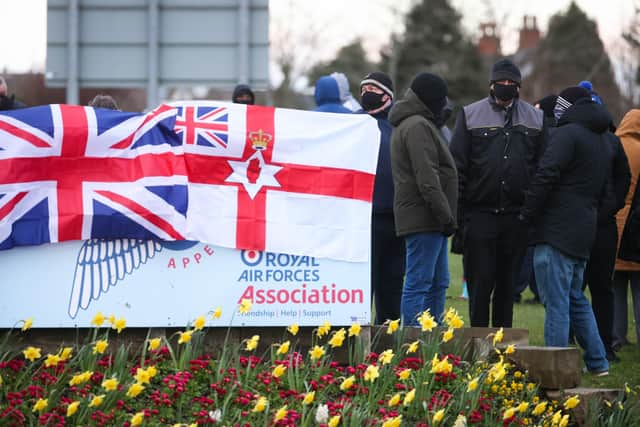Alex Kane: Loyalism should beware a retreat to its bad old ways


This is from Graham Spencer’s 2008 book, ‘The State Of Loyalism In Northern Ireland’: “What is clear across both organisations – UDA and UVF – is that the biggest problem now facing loyalism is loyalism itself. That without the threat of republican violence (apart from dissident groups …) there is no case for politically motivated violence and because of that no justification for the continuation of loyalist paramilitarism.
“This realisation was emphatic among all interviewed for this book. As such, this marks a significant step forward which has taken a long time to reach. One might perhaps discern that loyalism has moved on when the term loyalism itself becomes absent from the lexicon used to describe NI politics, and that those currently seen as loyalists may, over time, become viewed as working-class unionists.
Advertisement
Hide AdAdvertisement
Hide Ad“Once the expressions and articulations around tradition and culture are no longer threatening, but offer cross-communal potential for celebration and understanding, then intimidating aspects of loyalist culture … may give way to a more constructive and educational interpretation of meaning and exchange. What is reasonably certain though is that this position can only be realistically achieved from a position of confidence and a shift away from the constant perception of loss which has invaded the unionist imagination.”


Seven years later – around the same time as a security force assessment of paramilitarism concluded elements of the UDA, UVF and RHC were recruiting, had access to arms, were active and involved in serious criminality – the LCC was launched, with a Joint Declaration of Intent on October 13, 2015. It was the 21st anniversary of the CLMC ceasefire announcement.
The LCC recommitted to the principles of the Belfast Agreement, as well as eschewing all violence and criminality: ‘If there are those who attempt to use current or past associations with our organisations to further criminality they will be disowned and should be aware that they will not be permitted to use the cover of loyalism.’
The joint declaration further committed the LCC to playing a full and meaningful role in connecting loyalism to civic society, as well as growing confidence within detached communities in Protestant areas. It identified educational underachievement; law-abiding responses to criminality; and loyalist disenfranchisement in the political process as core themes.
Advertisement
Hide AdAdvertisement
Hide AdAs someone who has argued for years that the loyalist community within the broader unionist/pro-Union family needed a distinct and specific voice and input into everyday politics (particularly after 1998) I welcomed the LCC initiative. The issues raised in the joint declaration were not new ones; but had, for decades, been forced into the shadows by a mainstream unionism that had mostly just paid lip service to them, and by the stranglehold of various loyalist paramilitary groups which prioritised their own interests.
I also hoped the LCC would be able to move political/societal loyalism on from the ‘step forward’ which Graham Spencer had identified in 2008 (but which seemed to have stalled in the meantime). That’s why I was concerned when it took what came across as a very belligerent stand against Alliance in the 2017 general election, claiming the party was ‘driving a nail into the coffin of the Union’ and calling on unionist/loyalist voters to vote solely for unionist parties.
UUP leader Robin Swann said his party was one of law and order, which didn’t seek the votes of paramilitary groups and did not want the “backing of organisations still engaged in paramilitary or criminal activity”. While the DUP’s parliamentary chief whip, Jeffrey Donaldson, insisted the DUP didn’t want “the support of anyone or any organisation that continues to be involved in paramilitary or criminal activity”.
And here’s the difficulty I see now. The problem isn’t about loyalism not being heard: it’s the fact that it still seems to be the voice of loyalist paramilitarism that wants to be heard loudest and most often. The LCC has withdrawn its former support for the GFA and is also trying to dictate to both the UUP and DUP what their policies should be.
Advertisement
Hide AdAdvertisement
Hide AdMany in the pro-Union community had and have concerns with what the 2015 assessment of paramilitarism in NI described as the IRA Army Council’s role of overseeing ‘both PIRA and Sinn Fein with an overarching strategy’. I share those concerns and noted at the time that an unelected, democratically unaccountable, paramilitary-linked structure should not be overseeing the Assembly or Executive policy and strategy for any party.
That remains my view: hence my concern about the ongoing flow of statements from the LCC. I don’t know what role it’s trying to have, let alone play. It certainly seems a long way from its intentions of October 2015. And it’s to those intentions it should return. By all means use the various existing channels and conduits to let the political parties know ‘the fears and thinking on the ground’, but bear in mind Spencer’s comment about the need for confidence and shifting away from the perception (and there are few things as important as perception) of loss.
I know critics say, “What would you know about loyalism and working-class unionism?” Not everything, obviously, but probably far more than some of my critics realise. I also know what many people, including many within broader unionism and at Westminster, think of loyalism. And, as I say, perception is crucial at moments like this.